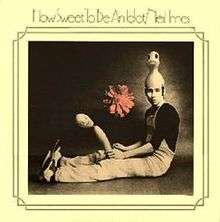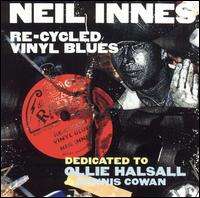How Sweet to Be an Idiot
| How Sweet To Be An Idiot | ||||
|---|---|---|---|---|
 | ||||
| Studio album by Neil Innes | ||||
| Released | 1973 (UK) | |||
| Recorded | March – July 1973 at Chipping Norton Studio, Oxfordshire | |||
| Genre | Pop/rock | |||
| Length | 37:56 | |||
| Label | United Artists | |||
| Producer | Neil Innes | |||
| Neil Innes chronology | ||||
| ||||
| Professional ratings | |
|---|---|
| Review scores | |
| Source | Rating |
| Allmusic | |
| Re-Cycled Vinyl Blues | |
|---|---|
 | |
| Studio album by Neil Innes | |
| Released | 1994 (UK) |
| Recorded | 1973 |
| Genre | Pop/rock |
| Label | EMI |
| Producer | Neil Innes |
| Professional ratings | |
|---|---|
| Review scores | |
| Source | Rating |
| Allmusic | |
How Sweet To Be An Idiot is the first solo album by Neil Innes, formerly of The Bonzo Dog Band and later of The Rutles, and was released in 1973. Innes later said of this time
United Artists had been very kind to me ... In my own way, I wanted to repay them – by making a bunch of silly singles at a time when the music industry still seemed to have a sense of humour. Wrong again.[3]
Stewart Mason, reviewing the album for Allmusic, described it as "split between tongue-in-cheek parody and straight pop songs" and containing "solidly melodic Beatlesque pop", but was critical of the "unfortunate sterility to Innes' self-production".[1]
The title track was released as a single but failed to chart. It was a more instrumented version than on the album, arranged by Richard Hewson, and "The Age of Desperation" was the B-side.[4] Its melody was borrowed by Oasis for their single "Whatever", released in 1994; Innes claimed plagiarism and as a result now receives royalties and a co-writing credit.[5][6]
The album was re-released by United Artists in 1980 under the title "Neil Innes A-Go-Go"[3] and by EMI in 1994 with additional tracks – most of which had been released on singles – under the title Re-Cycled Vinyl Blues.[2] This edition of the album was dedicated to Ollie Halsall, who had died in 1992, and former Bonzo Dog bassist Dennis Cowan, who had died in 1972;[7] it featured a guest appearance by Michael Palin on the title track.[2]
A review of the release by Mark Deming of Allmusic was more appreciative than that of his predecessor, saying that "most [of the tracks] walk a graceful tightrope between sly humor and solid pop-friendly rock & roll" and recommending that "anyone who digs a great hook played with heart should get to know the music of Neil Innes".[2]
Innes performed the title song on Monty Python Live at the Hollywood Bowl and on Monty Python Live at Drury Lane.[1]
Tracks
- All songs written by Neil Innes
- "How Sweet To Be An Idiot" and "Neil Innes-A-Go-Go" have identical track listings
Side one
- "Prologue" – 0:49
- "Momma Bee" – 2:47*
- "Immortal Invisible" – 4:04*
- "Topless A-Go-Go" – 4:08
- "Feel No Shame" – 6:12
Side two
- "How Sweet To Be An Idiot" – 2:45
- "Dream On" – 3:04 [listed as "Dream" on "Neil Innes-A-Go-Go"]
- "L'Amour Perdu" – 2:10
- "Song For Yvonne" – 2:52*
- "This Love of Ours" – 2:57*
- "Singing A Song Is Easy" – 5:08
Tracklisting for Re-Cycled Vinyl Blues
- "Re-Cycled Vinyl Blues" – 3:33
- "Angelina" – 2:50
- "Come Out into the Open" – 3:42
- "Prologue" – 0:51
- "Momma Bee" – 2:54
- "Lie Down and Be Counted" – 3:09
- "Immortal Invisible" – 4:12
- "Age of Desperation" – 2:34
- "Topless-A-Go-Go" – 4:04
- "Feel No Shame" – 6:24
- "How Sweet To Be an Idiot" – 2:51
- "Dream On" – 3:05
- "L'Amour Perdu" – 2:17
- "Song for Yvonne" – 2:57
- "This Love of Ours" – 3:04
- "Fluff on the Needle" – 5:36
- "Singing a Song Is Easy" – 5:04
- "Bandwagon (Live)" – 4:31
Personnel
- Neil Innes – vocals, guitar
- Andy Roberts – rhythm guitar
- Mike Kellie – drums
- Dave Richards – bass guitar
- Ollie Halsall – lead guitar, organ
- Gerry Conway – drums on *
- The Mucrons – backing vocals[4]
- Dennis Cowan – guitar on additional tracks for re-release
Notes
- 1 2 3 Mason, Stewart. "Review: How Sweet To Be An Idiot". Allmusic. Retrieved 4 August 2009.
- 1 2 3 4 Deming, Mark. "Review: Re-Cycled Vinyl Blues". Allmusic. Retrieved 4 August 2009.
- 1 2 Barbour, Danny (November 1994). "Neil Innes". Record Collector (183): 148–149.
- 1 2 "How Sweet To Be An Idiot". www.bonzodog.org. Retrieved 4 August 2009.
- ↑ "Oasis – news, pictures, reviews, biography, videos, best songs, discography, books, DVDs, concerts, gossip, pictures and tour dates". NME. Retrieved 4 August 2009.
- ↑ Michaels, Sean (6 October 2008). "Have Oasis plagiarised Cliff Richard?". London: The Guardian. Retrieved 4 August 2009.
- ↑ "Dennis Cowan". www.neilinnes.org. Retrieved 4 August 2009.